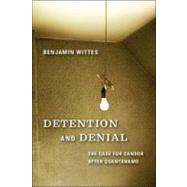Detention and Denial The Case for Candor after Guantánamo
, by Wittes, Benjamin- ISBN: 9780815704911 | 0815704917
- Cover: Hardcover
- Copyright: 12/21/2010
Barack Obama and John McCain agreed on very little during the 2008 presidential campaign, but both promised to shut down the detention center at Guantánamo Bay. Nearly two years later, "Gitmo" is still open, and it is unclear if and when that might change and what it actually means in the long run. Many Americans choose to remain blissfully ignorant about how their nation prosecutes the War on Terror, and public officials are happy to oblige them. But whether they realize it or not, the U.S. continues to detain individuals it deems enemy combatants.Benjamin Wittes pulls back the curtain of silence to discuss what the U.S. and its allies currently are doing in the way of detention, and what they ought to be doing. Current policy is incoherent and muddled, sending mixed and confused signals. While that is perhaps understandable, given public ambivalence about detention, this is ineffective and counterproductive. Out of sight means out of mind to many people, but pretending a problem no longer exists does not make it so. Just because someone is not detainedat Guantánamo doesn't mean that person won't be detained elsewhere, by either U.S. forces or its proxies.Detention is an easy target for eager-to-please politicians and indignant commentators. But the issue truly is complex. Many detainees cannot simply be allowed to walk away. And things are not always as they seem. While reduced detention may assuage some angst, it might mean that potential detainees are being killed at a higher rate. Does that really ease worries about America's moral compass?Wittes issues a persuasive call for greater coherence, clarity, and candor in detention policy and practices. He lays out some of the problems that could result from the current state of obfuscation. For example, captured al Qaeda fighters can be detained by friendly "host governments" such as the Karzai regime. But if another front opens on the War on Terror, in a country such as Somalia or Yemen, the U.S. may need to detain its own prisoners. But it will find itself painted into a corner by the public assumption that "we don't operate that way." Far better to be frank and direct about the dangers we face andhow to deal with them.







